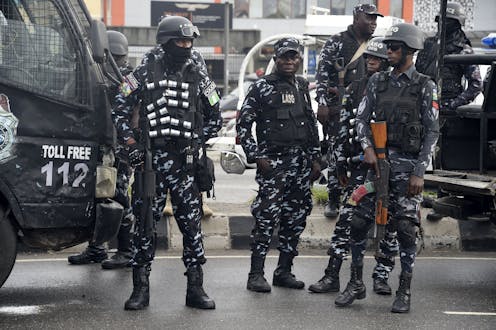
Nigeria’s President Bola Tinubu named a new inspector general of police on 19 June 2023. He appointed the deputy inspector general, Kayode Egbetokun, to replace Usman Alkali Baba, whom former president Muhammadu Buhari had appointed in April 2021. Egbetokun will serve in an acting capacity pending his confirmation by the senate in accordance with Nigeria’s constitution. In this interview with The Conversation Africa, participatory policing expert Lanre Ikuteyijo suggests an agenda for the new police chief.
What are the major issues confronting the new police inspector general?
The major issues are police accountability and transparency, professionalism within the police, inter-agency collaboration and police welfare. Further, he must review police activities leading to the 2020 #ENDSARS protests against police brutality and then follow up with the reforms promised after the protests. The Buhari government promised mental evaluation for new police recruits, improved welfare for policemen, disbandment of the Special Anti-Robbery Squad and legislation for community policing.
How should he tackle these issues?
He must continue to enforce discipline in the police like his predecessor. Some erring officers were reportedly dismissed during the era of Baba Alkali, which gave some semblance of accountability. Police activities are supposed to be regulated through both internal and external mechanisms. The internal regulatory mechanism must be strengthened to make officers carry out their duties responsibly. Lack of discipline has been identified as a contributor to ineffective law enforcement.
He must also ensure the professionalisation of the police. At present, police services are commodified: some elites and celebrities have more police protection than some entire communities. There have been reports of some police officers performing domestic chores for elites. He must stop this by ensuring regular training of officers to improve their sense of duty and self-esteem.
He must also promote collaboration among the security agencies in the country. The police are the most visible among the agencies and are constitutionally responsible for the maintenance of law and order. However, the realities of contemporary security challenges, including the rise in banditry, kidnapping and cybercrime, have made it necessary for the police to have cordial working relationships with other security agencies. There should be a seamless relationship between the police, the armed forces and other paramilitary agencies. These include Nigeria Security and Civil Defence Corps and Nigeria Immigration Service. I’ve highlighted ways to achieve this in some of my past research.
He must also take the welfare of the police seriously. Issues needing attention include housing, promotion, medical, children’s education, pensions and gratuities of retired police officers, as well as the care of families of officers who died in active service.
Some of the promises the government made after the #ENDSARS protests are yet to be fulfilled. The new inspector general should ensure the steps taken by his predecessor are completed. The main demand was for better salaries and welfare of police officers. Another demand was to ensure justice for those maimed by some members of the defunct Special Anti-Robbery Squad, and compensation for their families. All those arrested during and after the protests but to whom no crime has been traced should be released and compensated as well.
Read more: Nigeria's police work under terrible conditions: what needs to be fixed
The immediate past police chief faced some of these issues too. Why are they recurring?
Most of these problems are structural and were there even prior to the tenure of the past police chief. The solutions will therefore require deliberate actions on the part of the police management. It will take a willing police chief and a ready president to bring about the changes.
It’s a good start that Mobile Police Force personnel attached to ex-governors, former ministers and lawmakers have been withdrawn. The government too must have the political will to drive police reforms.
What agenda did the last police chief follow and how successful would you say he was?
The last police chief came to power on the heels of protests, essentially against police brutality and for a change of guard among the service chiefs. He started by addressing some of the issues raised by the public. Some errant officers were publicly disciplined. He also tried to implement the increment in salaries of police officers as well as other conditions of service (the level of actual implementation or success is yet to be determined). He addressed other issues such as promotion and uniforms. I will say he did not succeed in bringing about reformation, but he laid a foundation on which his successor can build to ensure that Nigeria has a better and more professional police force.
Read more: Nigeria's police: few promises of reform have been kept a year after #EndSARS protests
.
What new things would you recommend for the new police chief?
He should work towards the digitisation of the police. This of course will require training and retraining of officers to equip them with modern, smart and virtual policing skills.
More work should equally be done to promote a healthy police-civilian relationship. The public relations department has a lot of work to do in this regard. Innovative public engagement via social media platforms and regular town-hall meetings with stakeholders could be introduced too.
The reward system should also be as effective as the improvement in the discipline witnessed in the last few months. There are several dedicated, outstanding and gallant police officers across the country who are giving their best to ensure the country is safe, true to their calling. These should be rewarded to serve as both specific and general motivations.
Lanre Ikuteyijo does not work for, consult, own shares in or receive funding from any company or organisation that would benefit from this article, and has disclosed no relevant affiliations beyond their academic appointment.
This article was originally published on The Conversation. Read the original article.







